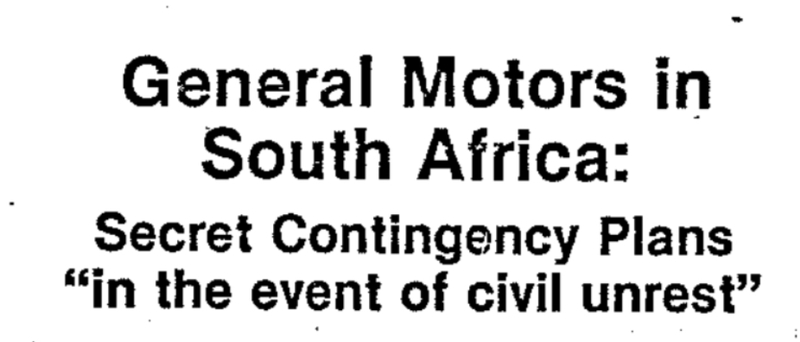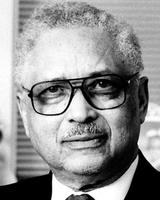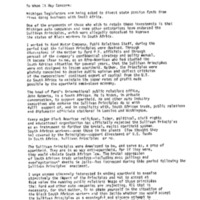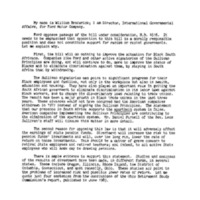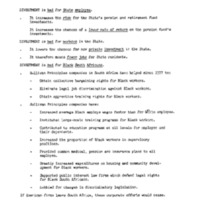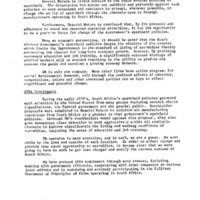Corporate Response: The Sullivan Principles
U.S. Corporations in South Africa
American corporations with investments in South Africa faced considerable pressure in the late 1970s from national anti-apartheid coalitions, religious and labor groups, civil rights organizations, and the growing campus divestment movement. “The giant multinational corporations we were being educated to serve,” one African American student activist recalled, “seemed a dominant force in South Africa, maintaining the status quo.” At the national level, human rights coalitions coordinated the push for corporate disinvestment and U.S. economic sanctions on South Africa—led by established groups such as the American Committee on Africa (founded by civil rights leaders in 1953) and new organizations such as TransAfrica (started by black activist Randall Robinson in 1977). Liberal religious organizations such as the National Council on Churches, which had been speaking out against apartheid since the mid-1960s, also pressed corporations to withdraw and passed some of the earliest divestment resolutions. The American Friends Service Committee (AFSC), a Quaker organization based in Philadelphia, issued a typical anti-apartheid manifesto in 1977. The AFSC demanded that the South African government “repudiate” the apartheid system and called upon the U.S. government and American corporations to suspend investments and other business activities. The AFSC also urged all Americans to join the international anti-apartheid movement and “take action that will expose the government of South Africa to external nonviolent pressure,” including divestment campaigns to force the withdrawal of U.S. companies.
The United States had long been South Africa’s largest and most influential trading partner. By the late 1970s, around 350 U.S. companies maintained direct operations in South Africa, including half of the largest firms in the Fortune 100. American business investments totaled around $1.7 billion, with an additional $2 billion in loans from financial institutions. Michigan-based Ford and General Motors controlled one-quarter of South Africa’s automobile market, with other American industrial sectors making up nearly half of the oil market and almost three-fourths for computers and electronics. While these corporations and their political supporters argued that American investment would bring economic benefits to black South Africans and work to reform racial conditions, direct evidence for this “free trade” philosophy proved hard to find in the late 1970s. “The net effect of American investment,” a study by the Senate Subcommittee on African Affairs concluded, “has been to strengthen the economic and military self-sufficiency of South Africa’s apartheid regime.”
During the 1970s, U.S. government policy toward South Africa combined public criticism of the apartheid system with defense of an alliance with the apartheid nation based on economic and national security interests. The Nixon administration praised the South African government as a staunchly anticommunist force for stability on the subcontinent and combined the formal U.S. policy of opposition to racial apartheid with a rejection of those who sought “a violent solution,” which referred to the African National Congress and other liberation movements in Southern Africa. In 1973, Nixon praised the “particularly gratifying” effects of American corporations with manufacturing facilities in South Africa, who “recognized that they were in a unique position to upgrade conditions and opportunities for all their employees regardless of race,” including the apartheid nation’s nonwhite majority. Nixon did support the U.S. embargo on the sale of military weapons to any of the nations in Southern Africa, as did his Democratic successor.
President Jimmy Carter, who made human rights a cornerstone of his foreign policy, declared that the United States “deplore[s] apartheid and any sort of racial discrimination, and we strongly support the establishment of majority rule government in South Africa.” Carter did not, however, support broader economic sanctions against the South African government or prohibitions against American corporate investment, despite pressure from congressional liberals and the anti-apartheid movement. Instead, like Nixon, Carter believed that “American businessmen can be a constructive force achieving racial justice within South Africa,” based on the free trade philosophy that economic development would bring social progress. The Carter administration argued that American industries could be a “force for positive change . . . by improving conditions for their own Black employees,” an endorsement of the controversial code of corporate conduct known as the “Sullivan Principles.”
The Sullivan Principles
The Sullivan Principles provided American corporations with a blueprint for maintaining their presence in South Africa and resisting the divestment movement by pledging equal treatment of nonwhite employees and other programs to improve their living conditions. In 1977, in a preemptive move against the threat of economic sanctions and divestment resolutions, twelve of the largest U.S. corporations collectively agreed to a “Statement of Principles of U.S. Firms with Affiliates in the Republic of South Africa,” better known as the Sullivan Principles. The Reverend Leon Sullivan, a civil rights leader from Philadelphia and a board member of General Motors, proposed the corporate code of conduct and argued that economic development benefited nonwhite workers, in apartheid South Africa as in American inner cities. By the end of the year, more than one hundred American firms had signed on to the agreement, a total that had doubled by the mid-1980s. Even though the South African government expressed its approval of the measure, around half of U.S. companies operating in the nation did not participate. Like Jimmy Carter, Republican president Ronald Reagan embraced the Sullivan Principles as a free trade measure that would “improve the living standards of South Africa’s black majority” by maintaining “the highest standards of labor practices for progressive employers” conducting business with the apartheid regime.
The Sullivan Principles contained six provisions:
1. Nonsegregation of the races in all eating, comfort, and work facilities.
2. Equal and fair employment practices for all employees.
3. Equal pay for all employees doing equal or comparable work for the same period of time.
4. Initiation of and development of training programs that will prepare, in substantial numbers, blacks and other nonwhites for supervisory, administrative, clerical, and technical jobs.
5. Increasing the number of blacks and other nonwhites in management and supervisory positions.
6. Improving the quality of life for blacks and other nonwhites outside the work environment in such areas as housing, transportation, school, recreation, and health facilities.
Anti-apartheid organizations attacked the Sullivan Principles as a smokescreen designed to undercut the divestment movement without challenging the apartheid system in any meaningful way, often pointing out that even the South African government supported the initiative. In a 1981 pamphlet, the American Committee on Africa labeled the Sullivan Principles a cosmetic gesture that “make no demand for change in the fundamental structure of apartheid, no demand for black political rights.” Instead, American corporations viewed the Sullivan Principles as a “deflector of criticism” and an effective way for institutions, in particular university boards, to resist campus divestment campaigns and instead pledge to ask businesses to comply with the code of conduct. The ACOA pointed out that the Sullivan Principles only covered economic and not political rights and that not even one percent of South Africans worked for American corporations and would therefore see benefits, and that many U.S. firms were not even in compliance with the code. At a broader level, the ACOA declared that “by strengthening the apartheid economy, the U.S. involvement increases the ability of the white government to preserve its power.” And despite their claims to improve racial conditions, the ACOA concluded, American corporations did little or nothing to protest “the repressive apparatus of the apartheid state.”
The American Committee on Africa called on universities, city and state governments, religious institutions, and other socially conscious entities to demand corporate divestment from South Africa. If a broad-based movement coalesced to withdraw investments from the banks and firms with holdings in South Africa, “they will be exerting the kind of pressure that corporations pay attention to: economic power.” The ACOA report also quoted a statement by Stephen Biko, the South African anti-apartheid activist murdered by the police in 1977, that “foreign investment supports the present economic system of political injustice. . . . If Washington is really interested in contributing to the development of a just society in South Africa, it would discourage investment.” The African National Congress went even further, demanding “total isolation of the racist regime—no investment and withdrawal of existing investment.” Michigan state representative Perry Bullard, an Ann Arbor-based politician and key leader of the legislative campaign for divestment, invoked this ACOA report in his own rejection of the Sullivan Principles, which he labeled “clearly impossible to implement” in an apartheid system that “ensures through law and custom that no black may ever hold a position of authority over a white worker.” Bullard promoted full American divestment in solidarity with the struggle of black South Africans “to completely dismantle the apartheid structure erected by the white minority government.”
General Motors, Ford, and Apartheid
The two largest automobile companies in the world, both headquartered in the state of Michigan, became primary targets of the divestment movement at the national, state, and local levels, including student-faculty campaigns at Michigan State University and the University of Michigan. In 1978, the Africa Fund of the American Committee on Africa circulated an expose titled “General Motors in South Africa” that contained two previously secret memos revealing a formal security agreement between the U.S. corporation and the apartheid government. After the Soweto uprising, the GM subsidiary in South Africa developed plans for white South Africans with military training to be stationed as “GM commandos” in “in the event of civil unrest” near its plants. The South African government likewise labeled GM facilities to be “National Key Points,” so essential to national security that the regime would protect them in order to maintain production in the event of another uprising. According to the ACOA, the leaked documents “make a mockery of GM’s claim to act as a force for change in South Africa.” The GM managers had developed a contingency plan to “cooperate fully in suppressing” any major protest by black South Africans that threatened the company’s interests, considered “as identical” to those of the apartheid regime. The ACOA warned that the Sullivan Principles operated to disguise the South African government’s “well laid plans to use these companies [GM and Ford] to protect its system of white supremacy.” The only solution: joining South African blacks in “demanding that the United States withdraw its corporate interests.”
Anti-apartheid activists also charged the Ford Motor Company with disguising its support for apartheid behind the ineffective Sullivan Principles. During the divestment debates in the Michigan state legislature, a former Ford employee in the Public Relations department published an open letter accusing auto company executives of working closely with South African lobbyists and diplomats to implement the Sullivan code in the late 1970s. “The Principles were plainly concocted,” John Woodford of Ann Arbor alleged, “to deceive public opinion and deflect criticism” of corporate profits “made possible by the apartheid semi-slave economy.”
William Broderick, Ford’s head of International Government Affairs, made the opposite claim, that his company and other American firms had done “more to improve the status of Blacks and to eliminate discrimination against them by staying in South Africa than by withdrawing.” In 1983 testimony to the state legislature, the Ford Motor executive insisted that opposition to divestment “is a morally responsible position and does not constitute support for racism or racist governments.” Ford’s “Case Against Divestment” position paper argued that such a policy would hurt Michigan residents and South African workers alike and claimed that American corporations had sought improvements in the apartheid system as well as raised wages and improved economic conditions for their black employees.
By 1983, the growing political strength of the anti-apartheid movement had convinced General Motors to emphasize how “firmly opposed” the company felt toward the apartheid system. GM joined Ford Motor Company in arguing that its presence in South Africa sought equal treatment for nonwhites and brought a “positive force for change of the government’s apartheid policies.” GM also stated that on many occasions the company had worked “to get laws changed and modify the current customs of South Africa,” most of all through its genuine commitment to the Sullivan Principles. Such progress might be slow, but corporate-inspired reforms remained preferable to “a violent solution,” an indirect reference to the African National Conference and the militant wing of the black liberation struggle. “There is no magic solution,” GM insisted, “neither divestment or anything else.”
Back in 1978, when the Board of Trustees at Michigan State University approved a full divestment resolution, the administration contacted major corporations based in Michigan and requested that they withdraw from South Africa instead. General Motors and Ford both refused and instead emphasized their commitment to the reform of apartheid through the Sullivan Principles. Dow Chemical not only declined but also threatened to curtail its donations to Michigan State, leading each side to accuse the other of blackmail. The Regents of the University of Michigan took a different path in the late 1970s, embracing the Sullivan Principles as the measure of responsible corporate investing and setting up an a showdown with anti-apartheid divestment activists on campus.
Sources for this page:
Individual document citations are at the full document links and are all from the Perry Bullard Papers, Bentley Historical Library, University of Michigan.
William Minter, Gail Hovey, and Charles Cobb, Jr., eds., No Easy Victories: African Liberation and American Activists over a Half-Century, 1950-2000 (Lawrenceville, N.J.: Africa World Press, 2007), esp. chapter 4.
Marc Fisher, “Showdown over South Africa: The Second Coming of Student Activism,” Change (February 1970), 26-30.
Alex Thomson, U.S. Foreign Policy Towards Apartheid South Africa, 1948-1994 (New York: Palgrave Macmillan, 2008), 102-105.
Jimmy Carter, “Interview with the President: Question-and-Answer Session with Black Media Representatives,” January 10, 1979, Public Papers of the Presidents of the United States, 1979, Book I, 38-40.
Francis Njubi Nesbitt, Race for Sanctions: African Americans against Apartheid, 1946-1994 (Bloomington: Indiana University Press, 2004).
David L. Hostetter, Movement Matters: American Antiapartheid Activism and the Rise of Multicultural Politics (New York: Routledge, 2006).
“Blackmail Cannot Affect Divesture,” State News, October 25, 1978.

